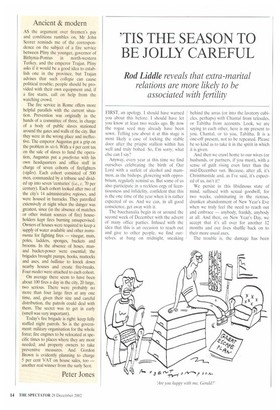'TIS THE SEASON TO BE JOLLY CAREFUL
Rod Liddle reveals that extra-marital
relations are more likely to be associated with fertility
FIRST, an apology. I should have warned you about this before. I should have let you know at least two weeks ago. By now the rogue seed may already have been sown. Telling you about it at this stage is most likely a case of locking the stable door after the priapic stallion within has well and truly bolted. So, I'm sorry; what else can I say?
Anyway, every year at this time we find ourselves celebrating the birth of Our Lord with a surfeit of alcohol and mammon, as the bishops, glowering with opprobrium. regularly remind us. But some of us also participate in a reckless orgy of licentiousness and infidelity, confident that this is the one time of the year when it is rather expected of us. And we can, in all good conscience, get away with it.
The bacchanalia begin in or around the second week of December with the advent of many office parties. Infused with the idea that this is an occasion to reach out and give to other people, we find ourselves. at bang on midnight. sneaking behind the arras (or into the lavatory cubicles, perhaps) with Chantal from telesales, or Tabitha from accounts. Look, we are saying to each other, here is my present to you, Chantal, or to you, Tabitha. It is a one-off present, not to be repeated. Please be so kind as to take it in the spirit in which it is given.
And then we crawl home to our wives (or husbands, or partners, if you must), with a sense of guilt rising even later than the mid-December sun. Because, after all, it's Christmastide and, as I've said, it's expected of us. isn't it?
We persist in this libidinous state of mind, suffused with sexual goodwill, for two weeks, culminating in the riotous, drunken abandonment of New Year's Eve when we truly feel the need to reach out and embrace — anybody, frankly, anybody at all. And then, on New Year's Day, we accept that it's all over for another 12 months and our lives shuffle back on to their more usual axes.
The trouble is, the damage has been done. Because I have a suspicion that, throughout those two weeks, God has been watching us, if from a distance; a God full of mischief and retribution.
The latest scientific evidence, you see, suggests that our bodies — and, more particularly, our genes — do not view the season's festivities and those singular, illicit couplings with quite the same sense of sangfroid or insouciance as we may believe. Our genes and our bodies seem to take them very seriously indeed.
I'll tell you why in a second, after this public-service announcement. I'm afraid that there is no way of explaining the whole thing without resorting to some fairly ghastly detail. So if you are of a sensitive disposition, or have a hangover and are feeling a little queasy, stop reading here and skip to the more mellifluous pastures of Glover or Hoggart.
We're talking here about female semen retention and male semen production, although — obviously — not in that order. Our genes, with moronic intent, have but one desire — to replicate themselves and thereby to ensure their perpetuation. Truth be told, they feel a little stifled within a safe monogamous relationship. Look, they argue, we've done our bit with this woman or this man. What we could do with now is a bit of diversification, if you get our meaning; a second (and preferably third, fourth and fifth) partner in which to embed ourselves. If you can see yourself clear to providing us with that chance — perhaps during the forthcoming party season, who knows? — we will do our best to ensure that there is a successful result.
And as far as genes are concerned, a successful result is quite the opposite of the result that you, or Chantal, for that matter, consciously desire, as you skulk away from the photocopying room beneath a gibbous moon, hoping nobody saw the two of you. It is the sort of result that people describe, with justification, as 'fifechanging'.
This latest research comes from Messrs R. Baker and M. Bellis, and it is full of horrible ironies, The first and most important two points are these: a) you are likely to produce more sperm in an 'extra pair copulation', as the two scientists charmingly put it; and b) just for good measure, Chantal (or whoever) is likely to retain more anyway (because she too is involved in an 'extra pair copulation'). So, immediately, your chances of conceiving a child are rather higher than would normally be the case.
There's more fun to come. Let's imagine that within the office environment Chantal was not necessarily your first choice of sexual partner. I mean, she's a lovely, lovely girl and all that, but, frankly . .. she's a bit on the, urn, largish side, you know? Fat, actually. But, hell, it was the office party and it was midnight. . . . Well, your troubles are mounting by the minute. Baker and Bellis tell us that, far from viewing Chantal with a certain weary, alcohol-assisted resignation, your genes are instead champing at the bit, so to speak. Because they adore big girls. And they will see to it that at the appropriate moment (i.e., in this case, at about one-and-a-half minutes past twelve) Chantal receives the most glitteringly fecund of deposits.
We now have three reasons why you're more likely to conceive than if you had gone home at 11.30 with a peck on the cheek from Phyllis, the office manager, and attended romantically to your patient wife.
And now here's a fourth: let's assume that Chantal is avowedly polyandrous. We all know one or two girls who are polyandrous. And Chantal — well, let's face it, she agreed to accompany you to the washrooms, or wherever, at midnight, so the chances are that she is quite close to being the living embodiment of polyandry. Polyandrous in this context means she enjoys multiple sexual partners, Yes, I'm suggesting that Chantal might be a bit of an old slapper.
Very bad news: back to Baker and Bellis for yet more crushing iniquities: 'The number of sperm ejaculated is proportional to the risk of the female partner having been inseminated by another male as measured by the amount of time the couple have been apart.' It sounds a rather complex equation, I know, but I'm sure you get the gist. And understand the ramifications.
There's a final twist. Let's pretend that rather than waiting patiently at home your wife was also out at an office party. But a different office party, one where, at midnight, she made the mistake of disappearing into the washrooms with Taki, the handsome Greek photocopier engineer.
You have both been — albeit briefly — promiscuous, then. And the next day shimmers in a mist of mutual unspoken regret and remorse. The two of you ache to banish the dismal memory of the previous night and, indeed, you do so in the tender act of loving congress. Review, if you would, the scientific evidence we have already discussed, and you will discover that this is a very good moment to conceive your next, or first, child. Even more so if your wife's put a bit of weight on recently. Such delicious irony.
I read much of this stuff, by the way, in a very interesting book called Evolutionary Psychology. It was written by a man from the LSE called Chris Badcock. If the Carry On team ever make a film about evolutionary psychology, then they have a readymade name for one of the lead parts. But, as I say, it's a very interesting book. If a shade chilling in parts.
Rod Liddle is associate editor of The Spectator.



























































 Previous page
Previous page